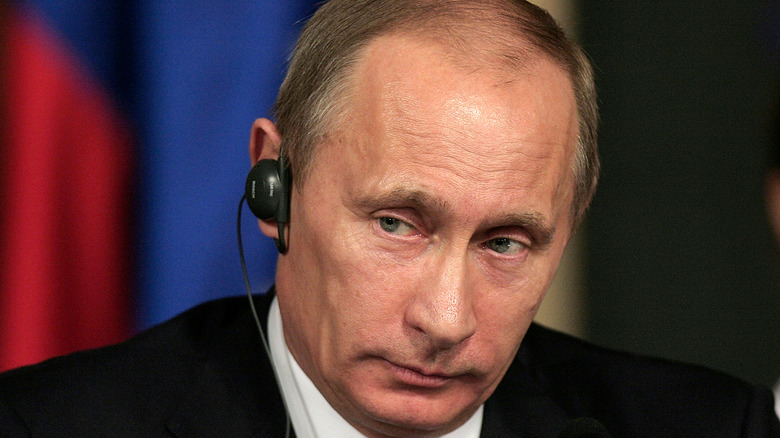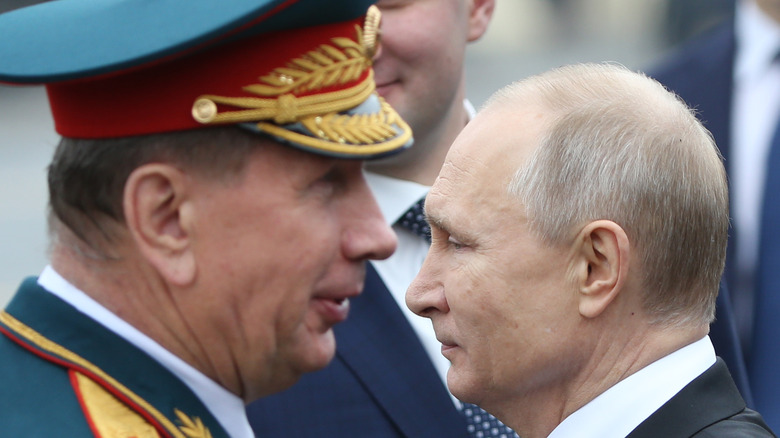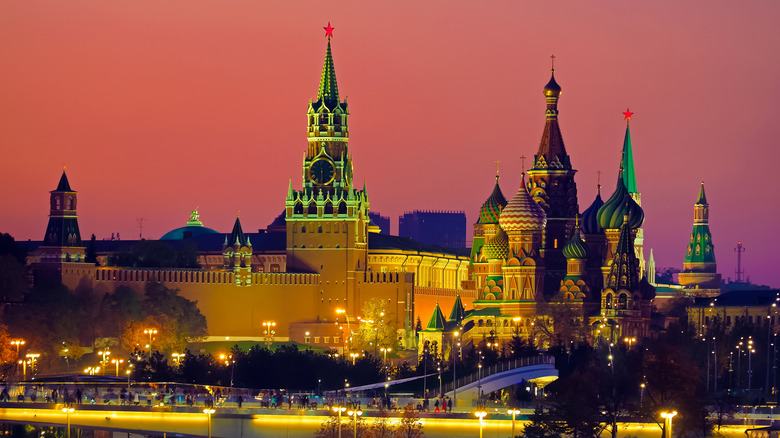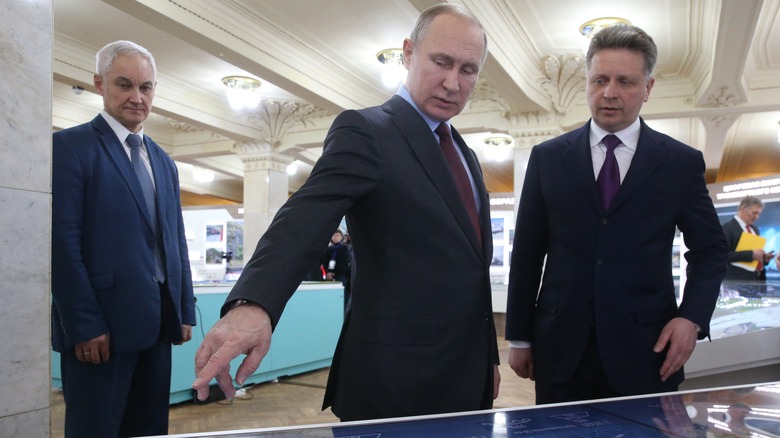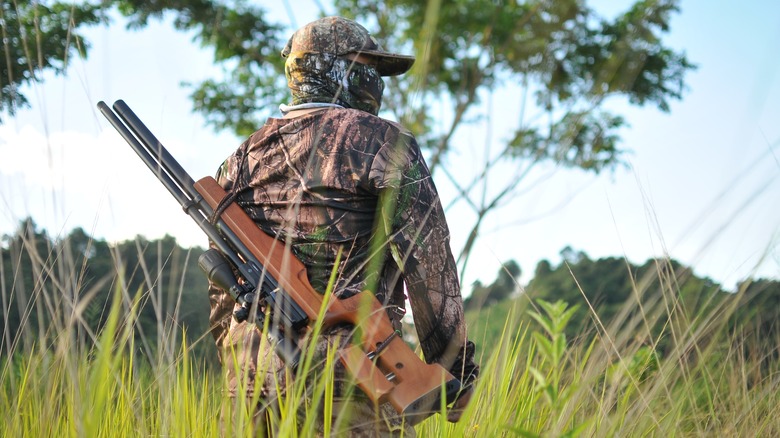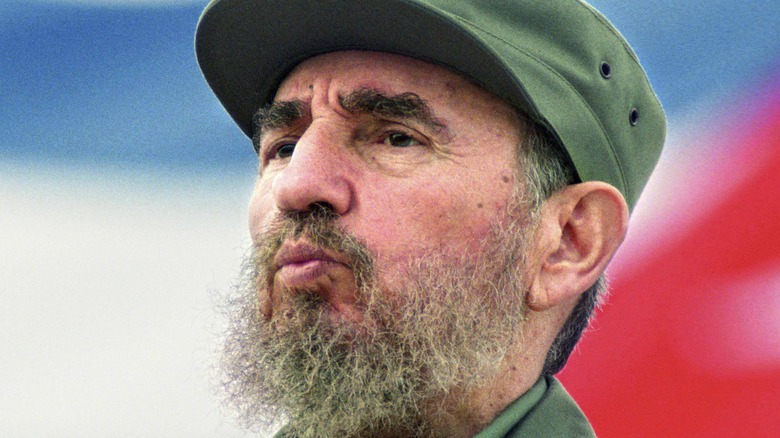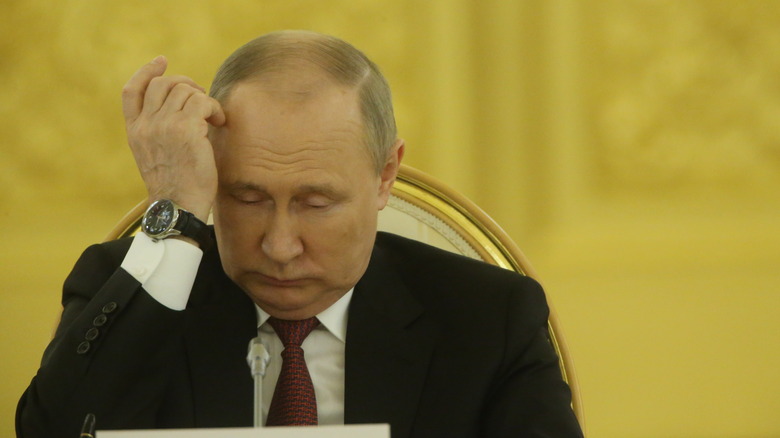How Vladimir Putin Escaped Multiple Assassination Attempts
Vladimir Putin has made plenty of enemies throughout his long political career. After a 15-year stint with the KGB, Putin held various other jobs before former President Boris Yeltsin appointed him to the prime minister position in 1999 (via Brittanica). Late that same year, he transitioned to the office of the president of Russia after Yeltsin stepped down — a position he held from 1999 to 2008. A four-year stretch followed where he was (again) the prime minister, and he assumed the presidential position once again in 2012, where he's been ever since. Putin has even changed the rules so that he can run for president again and again, which as CNN reports means he could be in power until 2036.
Being in the top political office for that length of time can mean that there are even more opportunities to have a target on your back — and it doesn't help that Putin's critics have a long history of disappearing under suspicious or mysterious circumstances. For example, investigative journalist Natalya Estemirova was looking into murder cases and kidnappings in Chechnya and was later shot dead in the woods near her house (via The Washington Post). Or the case of Boris Berezovsky, a leader who had a falling out with Putin and vowed to "bring him down." He was later found dead by suspected suicide — but the findings of his death were ruled as inconclusive. Putin has denied all involvement. Nevertheless, Putin himself has been the target of numerous politically motivated attacks over his decades in power.
The first attacks
During a 2017 interview, filmmaker Oliver Stone mentioned that Putin had served "three times as president, and five assassination attempts, I'm told?" (via YouTube). Five years and another appointment to the presidency later, Putin has had even more attempts against his life.
While attending the funeral of Anatoly Sobchak in St. Petersburg, on February 24, 2000, Putin was targeted. It is believed that this was the first known attempt to assassinate the Russian president, but the Federal Guard Service was there to protect him. As Rense reports, the press secretary for the Federal Guard Service, Sergei Devystov, commented on the matter, saying that "not a psychopath but a certain organization was behind the attempt."
The same year, there was another attempted assassination that was prevented by security forces. According to CNN, a group of former Russian leaders met with world leaders at the Yalta summit of the Commonwealth of Independent States. During the summit, which took place on August 18 and 19, 2000, a person was halted from killing Putin, who had been targeted specifically among the international leaders. He was among presidents from Azerbaijan, Georgia, Tajikistan, and several other countries who also attended, but this person was only focused on taking out Putin.
Explosives and prison time
The Security Service chief, Leonid Derkatch, announced they had successfully stopped the assassination attempt after the summit had concluded. Although the documents about this remain classified, several people were arrested in connection with the event: four Chechens and an unspecified number of Middle Eastern nationals.
In 2002, Putin was once again in danger. As Rense reports, three months before Putin was set to visit Baku, Azeri security members were given information on an attempt set for January 2002. An Iraqi citizen with links to Afghanistan and Chechen rebel forces was planning a delivery of explosives. The man was arrested, along with the person he sent the explosives to Kyanan Rostam, was sentenced to 10 years in prison.
As Rense reports, Just one month later, there was another threat — and this time, it was up close and personal. A man drove into the Kremlin complex and jumped out of his car to talk to security members. The man said, "My name is Ivan Zaitsev. I'm the President of Russia. Now take me to Vladimir Putin!" The surprised security team checked his documents and then sent Zaitsev to receive an evaluation at a nearby hospital.
Man plans vengeance for his family
As Pravda RU reports, doctors reported back that Zaitsev had attempted the same thing in 2001, and both times had enthusiastically told people that he wanted to kill Putin. He told his psychiatrists that Putin was bringing Nazism to Russia, and that he was an undercover spy. "I've got to cut Putin's head off," he wrote in his diary. He was convinced that he was avenging his brother, who had died by beheading some years before.
The next attempt came in November 2002, when Putin was supposed to be driving along the Rublevo-Uspenskoye highway, right near the Kremlin headquarters. There were a group of people who claimed they were installing new signboards on the highway. Just hours later, a media outlet reported that they had found 40 kilos of explosives set to detonate along the highway. But the devices then disappeared. Vladimir Putin's car was rerouted. And to this day, officials refuse to comment on this matter, and deny that it ever took place, as Pravda RU reports.
Something very similar happened the next year. In June of 2003, a highway connecting St. Petersburg and Pskovwas targeted while President Putin was supposed to be heading that way. This time, police found a poorly made bomb hidden in a bag. Once again, no one was harmed, and Russian officials denied that the situation ever happened.
Top-notch security detail
As Reuters reports, in 2008, a sniper took aim at Putin, who was leaving the office of president, and Dmitry Medvedev, who was the incoming president. The two were reportedly taking a walk after Medvedev won the 2008 presidential election. But they were strolling in the area surrounding the Kremlin, which is known to be heavily guarded and have top-notch security, and the assassination attempt was a failure.
The next attempt to kill Vladimir Putin was in 2012. A group of Chechens were planning to detonate a roadside bomb (via Express). But once again, the plan was foiled before Putin was harmed.
Although it is difficult to determine the exact number, Putin has escaped at least seven assassination attempts. This is partially due to the tight security for Russian officials. As Insider reports, security is very strong in the Kremlin complex, where many official government meetings take place.
Advice from a surprising source
The Presidential Regiment, a highly-trained security force, keeps watch over the Kremlin. The complex has guard towers to keep an eye on the premises. Security teams members must be constantly vigilant and be able to hear a whisper from 20 feet away, and are required to adhere to specific weight requirements as well as fit within a certain standard of height (via Insider).
In the 2017 interview with Oliver Stone, Putin discussed the attempts on his life, estimating at that time that there had been five prior attempts to assassinate him. Putin admitted he had gone so far as to ask for advice from another leader who had way more experience in this area.
Putin asked Cuba's president, Fidel Castro, about the Cuban's security detail. NBC News reported in 2016, that Castro had been the target of more than 600 assassination attempts. (Castro lived to age 90, so clearly no one succeeded). Putin recalled, "I talked to Castro about that. And he said to me: 'Do you know why I'm still alive? Because I was always the one to deal with my security personally.'" Putin added, "I do my job, and the security officers do theirs, and until now they are still performing quite successfully" (via YouTube).
Putin survived an alleged assassination attempt in 2022
In May 2022, Vladimir Putin was under intense scrutiny from around the world after making the call to invade Ukraine. This was followed by a new assassination threat as it put Russia at war, or, as he put it according to Reuters, in the midst of a "special military operation." While his Ukrainian counterpart Volodymyr Zelenskyy grabbed headlines after surviving more than a dozen assassinations (via Insider), in May 2022, news broke that Putin had survived yet another assassination attempt.
According to Yahoo! News, word of the failed assassination attempt on Putin came from Maj. Gen. Kyrylo Budanov, Chief of the Defence Intelligence of Ukraine. Budanov told Ukrainian news outlet Pravda Ukraine that an attempt took place a couple of months prior, during the early phase of the invasion. "This is nonpublic information. Absolutely unsuccessful attempt, but it really took place. ... It was about two months ago."
Budanov did not get into specifics about how the assassination plot was devised or how it failed, but he did state that the attempt was made when Putin made a trip to the Caucusus just a few days after launching the invasion. According to Newsweek, the Caucasus is a region made up of parts of southern Russia as well as the nations of Armenia, Azerbaijan, and Georgia.
